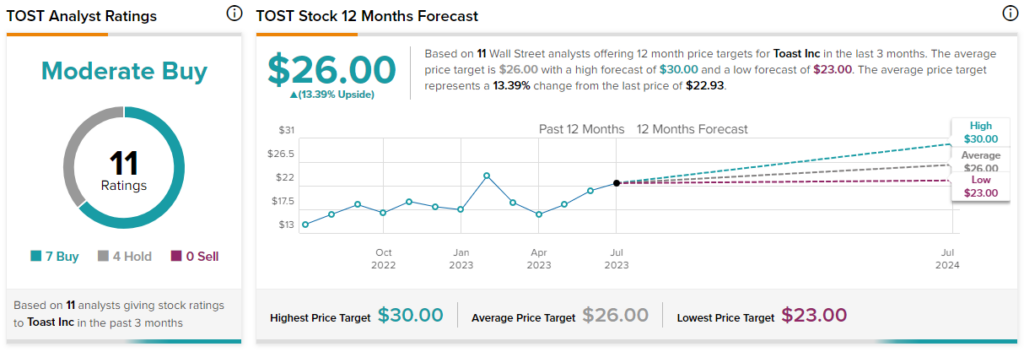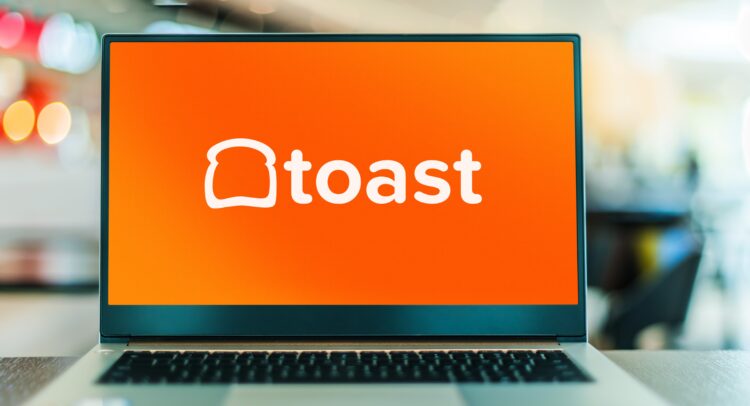Digital technology platform provider Toast (NYSE:TOST) – which specializes in restaurant management systems – didn’t have a great time last week. Shortly after implementing a controversial fee, management issued a reversal following a public outcry. Certainly, the leadership team looks ineffective because of its wishy-washy behavior. Still, Toast continues to struggle because of its longstanding obstacle — achieving profitability. I am mildly bearish on TOST stock.
Elevate Your Investing Strategy:
- Take advantage of TipRanks Premium at 50% off! Unlock powerful investing tools, advanced data, and expert analyst insights to help you invest with confidence.

TOST Stock Controversy Explained
In late June, Toast announced that it would implement a 99-cent fee to customers who place orders greater than $10 on the company’s Toast Online Ordering Channels. However, the catch was that Toast would charge its system clients’ customers directly.
At the time, BTIG analyst Andrew Harte assessed that Toast’s operators would likely be irritated. However, they lack negotiating power to contest Toast’s unilateral decision. Also, the market expert reasoned that customers are likely to overlook the 99-cent fee. Fundamentally, then, TOST stock should benefit from the revenue catalyst. As well, the profit margin for the fee would effectively be 100%.
Based on the estimate of orders coming through the Toast Online Ordering Channels, BTIG believed that Toast could generate $52 million of online ordering fee gross profit during Fiscal Year 2024. To be fair, the research firm suggested that TOST stock carried some risk as the Biden administration begins cracking down on junk fees. Nevertheless, the overall framework for the platform provider was positive.
Unfortunately, neither business operators nor customers found any positives with the fee increase. What was particularly problematic was that because customers were directly charged, the fee – which operators had nothing to do with – made individual eateries look bad. Subsequently, the public outcry forced a rare corporate admission.
“We made the wrong decision and following a careful review, including the additional feedback we received, the fee will be removed from our Toast digital ordering channels,” CEO Chris Comparato stated in a letter to customers.
Toast Returns to Face an Ongoing Dilemma
Naturally, TOST stock fell in part due to management suffering an egg on its face. Implementing a controversial decision and then quickly retracting it doesn’t provide confidence in competency. However, some pundits were confused. If Toast is doing the right thing, shouldn’t that be worth consideration? It is, but the downfall of TOST centers on an ongoing dilemma.
Essentially, Toast – while offering a compelling upside narrative – struggled to provide investors a clear pathway to profitability. For example, in February of this year, TOST stock suffered a severe drop in market value. The reason? Management reported a loss in the fourth quarter of 2022 of 19 cents per share. However, analysts estimated that the loss would come in at only five cents per share.
Later, following the Q1 disclosure in early May, TOST stock moved up. At the time, the net loss per share landed at four cents, narrower than the consensus estimate by a penny. Put another way, Toast demonstrated a realistic pathway to profitability, thus encouraging onlookers. Further, the fee – if it didn’t arouse such anger – would have likely attracted more investors.
Now, the leadership team must figure out a way to restore confidence in the earnings outlook without upsetting anyone. It’s a tall order because Toast has also attracted much more scrutiny as to its next moves.
Why the Fee Matters So Much
Still, investors may be confused why the drama over a relatively small fee would negatively impact TOST stock so much. A dollar extra probably won’t change any customer’s life, and reversing the decision shows good faith at the end of the day. However, the fee matters because of the underlying industry.
While various sources print different figures, the general consensus is that the profit margins for restaurants are low. For full-service restaurants, the margin lands between 3% to 5%. For bars, they may enjoy 10% to 15% margins, which are still low.
Fundamentally, a tech-driven restaurant management system should help improve these margins. In turn, Toast should reap its own rewards. Unfortunately, without that 99-cent fee, TOST stock faces an uphill battle because it’s hard to squeeze extra margin elsewhere.
Is TOST Stock a Buy, According to Analysts?
Turning to Wall Street, TOST stock has a Moderate Buy consensus rating based on seven Buys, four Holds, and zero Sell ratings. The average TOST stock price target is $26.00, implying 13.4% upside potential.

The Takeaway: TOST Stock Crumbled on the Profitability Question
Undeniably, Toast offers an intriguing and relevant product. However, the effectiveness of its system should have generated increased profitability, which isn’t happening. Management thought it had a solution through a direct-on-customer fee. Not only did that fail, but the move attracted extra scrutiny. Therefore, TOST stock returns to a perplexing dilemma in a worse-off position.
















